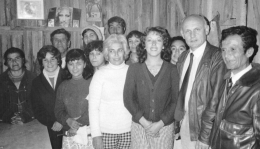The world has marked the 40th anniversary of the coup led by Chilean dictator Augusto Pinochet with events and debates about his 17-year rule of terror and torture, though I noted with too little reference to Ireland’s historical and cultural links with Chile, or what Ireland has learnt from the experience of the brutal dictatorship.
The visit of President Michael D Higgins and Minister for Trade and Development Joe Costello to Santiago last October was an important act of Irish solidarity with the people of Chile and a celebration of the historical links between our two countries. Indeed, the part played by two Irishmen, Bernado O’Higgins and John MacKenna, in Chile’s road to independence should not be forgotten. They both had a central role in Chile’s struggle, and were in fact celebrated three years ago with the simultaneous issue in Ireland and Chile of two new stamps by the Irish artist Ger Garland.
Bernado O’Higgins – whose father Ambrose O’Higgins was born in Ballynary, Co Sligo – was a leading figure in the movement to overthrow the ruling Spanish administration in the early 1800s, and a monument to him stands in Dublin’s Merrion Square. Meanwhile, John MacKenna – later Juan Mackenna – played a key role in the drive for independence as commander-general of the Chilean Army.
This connection with Chile was lost by the time of the coup and the regime led by General Pinochet, during which more than 30,000 people were arrested, and over 3,000 more ‘disappeared’. International support for the people of Chile during this time was remarkably mixed: the United States, for instance, helped to crush Chile’s democratic dream, backing opponents of the leftist Salvador Allende after he had been fairly elected, and actively supporting the military junta via the CIA.
Looking back, one can see that intervention in Chilean politics by the United States started as early as the War of Chilean Independence, its influence continuing for almost two centuries, and being repeatedly successful in impeding left-wing parties from gaining power. Allende in particular was feared because of his warm relations with Cuba and open criticism of the Bay of Pigs, besides concern about the threat of the nationalisation of US corporations.
In the 1980s, British Prime Minister Margaret Thatcher, became a staunch supporter of General Pinochet as a result of his support for the invasion of the Falkland Islands – sometimes described as “neutrality” – and he became a friend for life. When Pinochet died in 2006 without facing trial for his crimes, he was even thanked by Thatcher for “bringing democracy to Chile”.
Concern for suffering
When I was president of the Development Committee of the European Parliament, which is part of the budget authority of the EU, we introduced a special budget line in support of human rights and opposition groups in Chile. I was asked by a number of Chilean groups in Europe to try and make contact with Chilean prisoners in Santiago, so in July 1987 I arranged a trip with the help of the office of the European Commission in Santiago.
While there I visited the central prison accompanied by a human rights lawyer arranged by the commission, but was not entirely shocked when my request to meet political prisoners was refused. I was surprised, however, by the aggression and verbal abuse from prison officers hurled in my direction; my indifference to their onslaughts was not based on bravery but my limited language skills.
Thanks to the efforts of the commission staff in Santiago, I was able to meet various opposition sympathisers and visit some of the poorest districts of the city, so despite my failure to meet political prisoners, I was able to register the concern of the European Parliament about the suffering of the people.
Ireland was a founder member of the Council of Europe, with its commitment to human rights and democracy. A former President of Ireland (Mary Robinson) has served as the UN Commissioner for Human Rights, and two ‘sons of Ireland’ played a crucial part in the struggle for Chilean independence. With this legacy, it is clear that Ireland needs to be vigilant in promoting democracy and human rights in a world where the practice is too often a case of pick and choose.
Michael McGowan is a former MEP and President of the Development Committee of the European Parliament.












